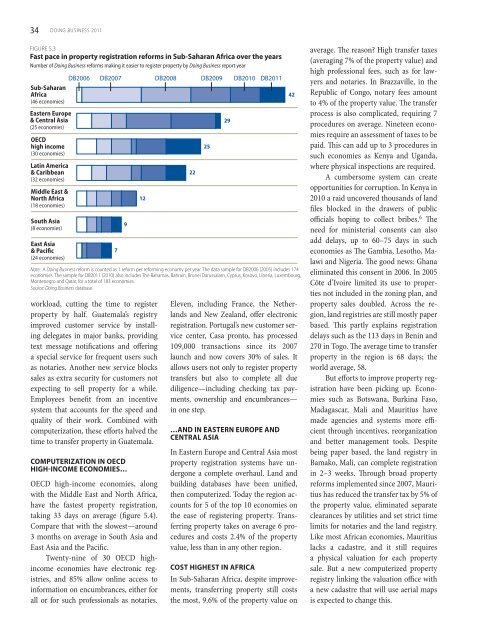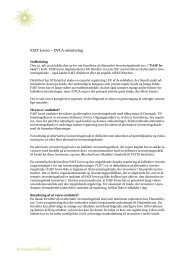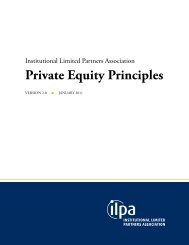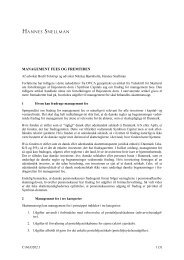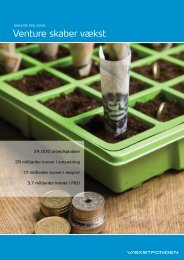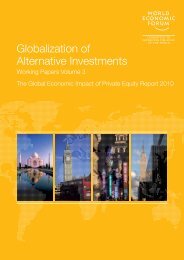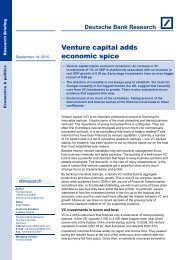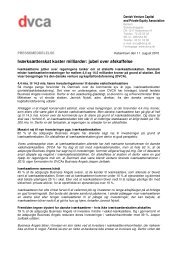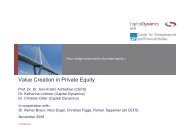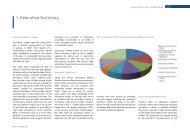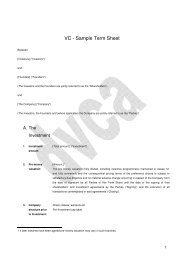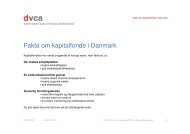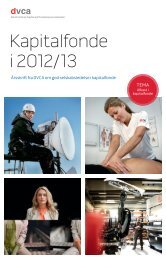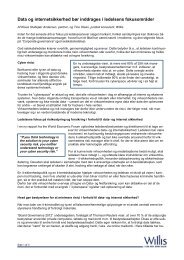A copublication of The World Bank and the - DVCA
A copublication of The World Bank and the - DVCA
A copublication of The World Bank and the - DVCA
Create successful ePaper yourself
Turn your PDF publications into a flip-book with our unique Google optimized e-Paper software.
34 DOING BUSINESS 2011<br />
FIGURE 5.3<br />
Fast pace in property registration reforms in Sub-Saharan Africa over <strong>the</strong> years<br />
Number <strong>of</strong> Doing Business reforms making it easier to register property by Doing Business report year<br />
Sub-Saharan<br />
Africa<br />
(46 economies)<br />
Eastern Europe<br />
& Central Asia<br />
(25 economies)<br />
OECD<br />
high income<br />
(30 economies)<br />
Latin America<br />
& Caribbean<br />
(32 economies)<br />
Middle East &<br />
North Africa<br />
(18 economies)<br />
South Asia<br />
(8 economies)<br />
East Asia<br />
& Pacific<br />
(24 economies)<br />
DB2006<br />
Note: A Doing Business reform is counted as 1 reform per reforming economy per year. <strong>The</strong> data sample for DB2006 (2005) includes 174<br />
economies. <strong>The</strong> sample for DB2011 (2010) also includes <strong>The</strong> Bahamas, Bahrain, Brunei Darussalam, Cyprus, Kosovo, Liberia, Luxembourg,<br />
Montenegro <strong>and</strong> Qatar, for a total <strong>of</strong> 183 economies.<br />
Source: Doing Business database.<br />
workload, cutting <strong>the</strong> time to register<br />
property by half. Guatemala’s registry<br />
improved customer service by installing<br />
delegates in major banks, providing<br />
text message notifications <strong>and</strong> <strong>of</strong>fering<br />
a special service for frequent users such<br />
as notaries. Ano<strong>the</strong>r new service blocks<br />
sales as extra security for customers not<br />
expecting to sell property for a while.<br />
Employees benefit from an incentive<br />
system that accounts for <strong>the</strong> speed <strong>and</strong><br />
quality <strong>of</strong> <strong>the</strong>ir work. Combined with<br />
computerization, <strong>the</strong>se efforts halved <strong>the</strong><br />
time to transfer property in Guatemala.<br />
COMPUTERIZATION IN OECD<br />
HIGH-INCOME ECONOMIES…<br />
OECD high-income economies, along<br />
with <strong>the</strong> Middle East <strong>and</strong> North Africa,<br />
have <strong>the</strong> fastest property registration,<br />
taking 33 days on average (figure 5.4).<br />
Compare that with <strong>the</strong> slowest—around<br />
3 months on average in South Asia <strong>and</strong><br />
East Asia <strong>and</strong> <strong>the</strong> Pacific.<br />
Twenty-nine <strong>of</strong> 30 OECD highincome<br />
economies have electronic registries,<br />
<strong>and</strong> 85% allow online access to<br />
information on encumbrances, ei<strong>the</strong>r for<br />
all or for such pr<strong>of</strong>essionals as notaries.<br />
DB2007 DB2008 DB2009 DB2010 DB2011<br />
7<br />
9<br />
12<br />
22<br />
25<br />
29<br />
Eleven, including France, <strong>the</strong> Ne<strong>the</strong>rl<strong>and</strong>s<br />
<strong>and</strong> New Zeal<strong>and</strong>, <strong>of</strong>fer electronic<br />
registration. Portugal’s new customer service<br />
center, Casa pronto, has processed<br />
109,000 transactions since its 2007<br />
launch <strong>and</strong> now covers 30% <strong>of</strong> sales. It<br />
allows users not only to register property<br />
transfers but also to complete all due<br />
diligence—including checking tax payments,<br />
ownership <strong>and</strong> encumbrances—<br />
in one step.<br />
…AND IN EASTERN EUROPE AND<br />
CENTRAL ASIA<br />
In Eastern Europe <strong>and</strong> Central Asia most<br />
property registration systems have undergone<br />
a complete overhaul. L<strong>and</strong> <strong>and</strong><br />
building databases have been unified,<br />
<strong>the</strong>n computerized. Today <strong>the</strong> region accounts<br />
for 5 <strong>of</strong> <strong>the</strong> top 10 economies on<br />
<strong>the</strong> ease <strong>of</strong> registering property. Transferring<br />
property takes on average 6 procedures<br />
<strong>and</strong> costs 2.4% <strong>of</strong> <strong>the</strong> property<br />
value, less than in any o<strong>the</strong>r region.<br />
COST HIGHEST IN AFRICA<br />
In Sub-Saharan Africa, despite improvements,<br />
transferring property still costs<br />
<strong>the</strong> most, 9.6% <strong>of</strong> <strong>the</strong> property value on<br />
42<br />
average. <strong>The</strong> reason? High transfer taxes<br />
(averaging 7% <strong>of</strong> <strong>the</strong> property value) <strong>and</strong><br />
high pr<strong>of</strong>essional fees, such as for lawyers<br />
<strong>and</strong> notaries. In Brazzaville, in <strong>the</strong><br />
Republic <strong>of</strong> Congo, notary fees amount<br />
to 4% <strong>of</strong> <strong>the</strong> property value. <strong>The</strong> transfer<br />
process is also complicated, requiring 7<br />
procedures on average. Nineteen economies<br />
require an assessment <strong>of</strong> taxes to be<br />
paid. This can add up to 3 procedures in<br />
such economies as Kenya <strong>and</strong> Ug<strong>and</strong>a,<br />
where physical inspections are required.<br />
A cumbersome system can create<br />
opportunities for corruption. In Kenya in<br />
2010 a raid uncovered thous<strong>and</strong>s <strong>of</strong> l<strong>and</strong><br />
files blocked in <strong>the</strong> drawers <strong>of</strong> public<br />
<strong>of</strong>ficials hoping to collect bribes. 6 <strong>The</strong><br />
need for ministerial consents can also<br />
add delays, up to 60–75 days in such<br />
economies as <strong>The</strong> Gambia, Lesotho, Malawi<br />
<strong>and</strong> Nigeria. <strong>The</strong> good news: Ghana<br />
eliminated this consent in 2006. In 2005<br />
Côte d’Ivoire limited its use to properties<br />
not included in <strong>the</strong> zoning plan, <strong>and</strong><br />
property sales doubled. Across <strong>the</strong> region,<br />
l<strong>and</strong> registries are still mostly paper<br />
based. This partly explains registration<br />
delays such as <strong>the</strong> 113 days in Benin <strong>and</strong><br />
270 in Togo. <strong>The</strong> average time to transfer<br />
property in <strong>the</strong> region is 68 days; <strong>the</strong><br />
world average, 58.<br />
But efforts to improve property registration<br />
have been picking up. Economies<br />
such as Botswana, Burkina Faso,<br />
Madagascar, Mali <strong>and</strong> Mauritius have<br />
made agencies <strong>and</strong> systems more efficient<br />
through incentives, reorganization<br />
<strong>and</strong> better management tools. Despite<br />
being paper based, <strong>the</strong> l<strong>and</strong> registry in<br />
Bamako, Mali, can complete registration<br />
in 2–3 weeks. Through broad property<br />
reforms implemented since 2007, Mauritius<br />
has reduced <strong>the</strong> transfer tax by 5% <strong>of</strong><br />
<strong>the</strong> property value, eliminated separate<br />
clearances by utilities <strong>and</strong> set strict time<br />
limits for notaries <strong>and</strong> <strong>the</strong> l<strong>and</strong> registry.<br />
Like most African economies, Mauritius<br />
lacks a cadastre, <strong>and</strong> it still requires<br />
a physical valuation for each property<br />
sale. But a new computerized property<br />
registry linking <strong>the</strong> valuation <strong>of</strong>fice with<br />
a new cadastre that will use aerial maps<br />
is expected to change this.


